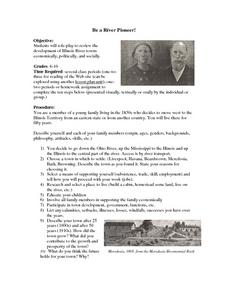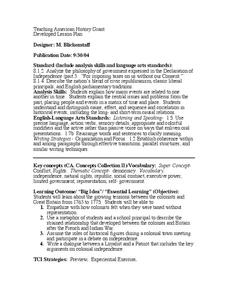Curated OER
Why Do Governments Exist? Locke, Hobbes, Montesquieu, and Rousseau
Here is a great secondary source reading that includes the primary ideas and philosophies of the famed Enlightenment philosophers: Thomas Hobbes, John Locke, Charles Montesquieu, and Jean-Jacques Rousseau. In additional to discussing...
Curated OER
Lesson 4: The Judiciary: A Brief Introduction to the Courts System
Focusing on the judicial branch of government, the fourth lesson in this series explores the structure of the US courts system. Beginning with an engaging activity based on the short story The Lady or the Tiger, students go on to examine...
Curated OER
Locke's Second Treatise on Civil Government
In this online interactive history worksheet, students respond to 10 short answer and essay questions about Locke's Second Treatise on Civil Government.
National Endowment for the Humanities
James Madison: Madison Was There
Madison was there! Scholars go on a journey to discover the person behind the founding father label as they explore James Madison's role in the formation of the United States government. The culmination is a writing assignment and...
Curated OER
Compare the United States Government with Other Political Systems
Young scholars explore the U.S. form of government and illustrate other forms of government found throughout the world. They explain the similarities and differences between the U.S and other governments.
Curated OER
The Need for Government—A Cinematic and Literary Perspective
Young scholars examine the philosophy of government. In this types of government instructional activity, students explore literature and movie clips to determine the value of rules in lawless societies.
Curated OER
Congressional Scenarios
In this U.S. government worksheet, students read 12 scenarios pertaining to government intervention and determine what to do as lawmakers in response to each of the scenarios.
Curated OER
Aristotle
In this online interactive philosophy worksheet, students respond to 10 short answer and essay questions about Aristotle. Students may check some of their answers on the interactive worksheet.
Curated OER
The Enlightenment in Europe: Ch 22
Why study European Enlightenment? Because our governing forefathers and constitution were shaped by their words and philosophies. Presented here are facts and achievements of 8 different figures from the enlightened era. Also included is...
Bill of Rights Institute
Celebrate Constitution Day
September 17 is a great day to focus on the US Constitution for on this day in 1787, the Constitution was signed. Through a series of activities, high schoolers get a chance to look closely at this famous document and the rights and...
Curated OER
In Praise of Political Parties
Students research a political party and prepare a report about its history, philosophy, and the party's position regarding two major political issues. They complete a variety of additional creative activities regarding their party, as well.
Curated OER
Modern Marco Polos: Searching for China
Students conduct Internet research to determine information about China's laws, government, philosophy, architecture, inventions, calendar and language. Students create a web site about ancient China and how it has influenced world history.
Curated OER
Basic U.S. Geography
Provide your 11th graders with a basic understanding of U.S. Geography. They label the state, regions, and boundaries found in the contiguous U.S. as well as Hawaii and Alaska. Then, they complete two Internet related activities.
PBS
Universal Declaration of Human Rights
What rights are guaranteed to students? Do they align with the Universal Declaration of Human Rights, which was approved by the United Nations in 1948? Middle and high schoolers present persuasive arguments about the rights they believe...
Curated OER
Mate Selection: Characteristics, Qualities, and Values
Students develop a personal philosophy about marriage while participating in power point presentation, classroom activities, and discussion. They compose a personal list of characteristics, qualities, and values desired in a marriage...
Curated OER
Influences of the Enlightenment on the American Declaration of Independence
Eighth graders participate in a lesson that focuses on the study of the Declaration of Independence. The freedoms outlined in the document are discussed. Students make connections between philosophy and the writing of the Declaration.
Curated OER
The Road to Democracy
Eleventh graders examine the road to the American Revolution. In this American Revolution lesson, 11th graders read Thomas Paine's works and identify the issues that the colonists had with the British government.
Curated OER
Be a River Pioneer!
Students role-play as pioneers in Illinois river towns. They research and choose a home town and participate in the development of the town. They present their simulation in either a written report or visual presentation.
Curated OER
Mate Selection: Characteristics, Qualities, and Values
Students develop a personal philosophy about marriage. They compose a personal list of characteristics, qualities, and values desired in a marriage partner and discuss why "You Don't Marry What You Want You Marry What You are".
Curated OER
Father's Figure
Students examine the concept of paternity leave. In this current events lesson, students explore European policies regarding parenting today and compare it with philosophies of the past.
Curated OER
Mongol Dynasty
Students identify and analyze the Yuan Dynasty; the Kings and Kingdoms; who the Mongols were and what they did; the Mongol Conquest of China; the Four Class Systems; the Genghis Kahn's rise to power; the Genghis Khan- Conquests; the...
Curated OER
The Declaration of Independence
Students empathize with the colonists. In this lesson on the Declaration of Independence, students collaborate to problem solve a school dilemma that enables them to understand the issues and difficulties that occurred in the creation of...
Curated OER
Building a Nation
Eighth graders identify the main ideas of the U.S. Declaration of Independence. They read and discuss text, read and summarize a section of the Declaration of Independence in small groups, and write a paper on why the colonists felt it...
Curated OER
Taxation Without Representation
Eighth graders empathize with how colonists felt when they were taxed without representation. They use a metaphor of students and a school principal to describe the strained relationship that developed between the colonies and Britain.

























